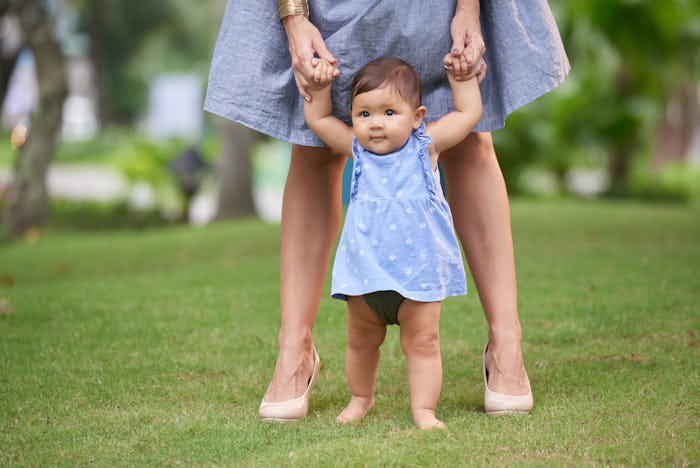Life

5 Signs Your Baby Needs Physical Therapy, According To A Pediatric Physical Therapist
Watching a baby grow up fills a parent's heart with pride and joy. But it can also fill a mom or dad with anxiety, especially if that baby is dealing with any developmental delays. If you're worried that your little one's physical development is lagging behind, you should be aware of the signs that your child might need physical therapy.
I spoke with Magdalena Oledzka, a pediatric physical therapist at New York's Hospital for Special Services, to learn more about what parents should watch out for. "If parents have any concern about their child’s development, they should first talk to their pediatrician," she says. It's never too early to start seeing a physical therapist, because early intervention is key.
You may not realize it, but there's actually a strong connection between a child's physical development and their development in other areas. An infant who can't sit up and interact with their loved ones, or a toddler who can't walk and chase around other children, can start to feel the effects in multiple ways. "Motor skills are the core of an infant’s everyday actions and social interaction and as a result perceptual, cognitive and social development," Oledzka says. If their motor skills lag behind, their other skills might start to as well.
If you're seeing any of these five signs in your child, you'll want to speak to their doctor about doing an evaluation.
1They're Not Lifting Their Head
Very young babies may do little more than eat and sleep, but Oledzka says you can start seeing signs of issues very early on. Holding their head up is one of the first milestones a newborn needs to hit. "While the inability to do so is very typical in a newborn and one-month-old, a 3-month-old should not have any difficulties lifting their head while on the tummy to look around," she says. It can be a sign of torticollis, according to Pathways.org, a condition in which a baby's neck muscles are too tight to work properly. It can often be addressed very effectively with physical therapy.
2They're Not Hitting Their Milestones
Holding their head up is just the first of many milestones for babies. Oledzka stresses that all babies do things at their own pace, and the age that they hit their milestones can be influenced by many different factors, including social and cultural backgrounds.
But while there's a range of what's considered normal, you'll want to have your child evaluated if they fall far outside those ranges. "Typically we would expect babies to roll between 4 and 6 months, start sitting independently around 5-7 months, being able to sit up on their own by 8-9 months, crawl on hands and knees somewhere around 8-10 months, pull to stand around 10-12 months, and take their first step between 10 and 15 months," says Oledzka. If a baby isn't hitting those milestones, low muscle tone could be to blame, according to Parents. It's an issue that can be greatly improved by physical therapy.
3They Can't Prop Themselves Up
Tummy time should continue well past the newborn stage — The Bump suggested making it a regular practice until at least 6 or 7 months old, when a baby can roll over on their own. If your child won't or can't stay on their tummy, it could be a problem. "Babies who are 7-9 months old who don’t assume extended arm prop, or who love to sit, but hate being on the mat on the belly, may have some core weakness and will need a bit of help to start transitioning to the mat and from the mat to sitting and quadruped," Oledzka says.
4They're Not Well Coordinated
Once your child is walking, you might feel like all the big milestones have been checked off the list. But there's more to watch out for as they get older. By the time they're 3 years old, the University of Minnesota Amplatz Children's Hospital noted that a child should be able to balance on one leg, jump up and down, and catch a ball.
If your toddler isn't yet accomplishing those tasks, or just generally seems clumsier than their peers, an evaluation could be in order. Though comparing your child to other kids isn't always a useful tactic, in the case of catching physical issues early, Oledzka says it can actually be really helpful. "The best advice for parents is to observe their child with their age peers on the playground. For instance, are they keeping up with their peers or are they staying to the side? Trip often? Avoid some of the playground equipment?"
5They Were Born Premature
Even the littlest babies can end up needing a little PT. "Physical therapy can start as early as a few days old," says Oledzka, even for babies who were born early. Multiple studies have shown that it can be a crucial part of helping preemies catch up with their peers, according to Temple University.
If you do choose to get your child evaluated for physical therapy, you don't have to stress about the outcome. Either you'll find out that they're doing just fine, or you'll get access to a resource than can be incredibly beneficial to them, says Oledzka. "You will be reassured that you took the right steps and that your child will get the right help."
This article was originally published on